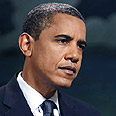
US President Barack Obama
צילום: AP
Obama hints Iranian elections limit chances for dialogue
In interview with CNN, US president signals that Iranian regime's violent oppression of election protests lower chances for bilateral talks with United States. 'What's happened over the next several weeks raises serious questions,' Obama says
Has the president of the United States given up on chances of holding dialogue with Iran? In an interview with CNN's Anderson Cooper, Obama signaled that a "change" has occurred in the chances for bilateral talks between Washington and Iran in light of the Iranian presidential elections and the regime's violent response.
"As I said before, given the outrageous violence that we've seen directed against peaceful demonstrators post election, the crackdown by hard liners against journalists, the raiding of foreign embassies, it's not clear whether or not you have the kind of room in Iran that would walk through the door that...we've left open for them to stand down on nuclear weapons development, and to be able to pursue a more peaceful path with their neighbors and abide by international norms," said Obama to Cooper.
When Cooper asked Obama if he thinks conditions for diplomatic relations have changed, the US president had a hard time answering directly, but hinted that a certain change has occurred.
"Well, I think that it's still in flux, and what we have to do is evaluate over the next several months both how...the...Iranian leadership works through what appears to be still dissention within it's ranks," explained Obama.
However, Obama noted that multi-lateral talks with Iran are still on the agenda – in the meantime.
"I think it's important for us to recognize that although... the prospects of bilateral engagement may have been...shifted as a consequence of this post election activity, that we still have a multilateral track with the Europeans and the Russians and the Chinese and others that...no matter what happened we were going to have to mobilize to help to obtain some sort of serious agreement with the Iranians, and that diplomatic effort is going to continue.
"So, you know, what we agreed to at the G8 was that we would re-evaluate at the end of August, end of September, how the Iranian government is responding, and my hope is that they continue to see this as an opportunity, but obviously what's happened over the next several weeks raises serious questions," Obama continued.
At the end of the first day of G8 meetings in Italy last week, the leaders announced their decision to put a time limit on talks with Iran on their nuclear program until September. This is in line with Israel's recent efforts calling to limit talks with Iran. Defense Minister Ehud Barak recommended in December of last year limiting US-Iranian talks to a limited time period, after which UN sanctions would be imposed on Iran.
Last week, US Secretary of State Hilary Clinton announced her support for imposing harsh sanctions on Iran on the backdrop of the regime's continued refusal to heed demands to halt its nuclear program and Iran's violent oppression of the demonstrations against the disputed presidential election results.










